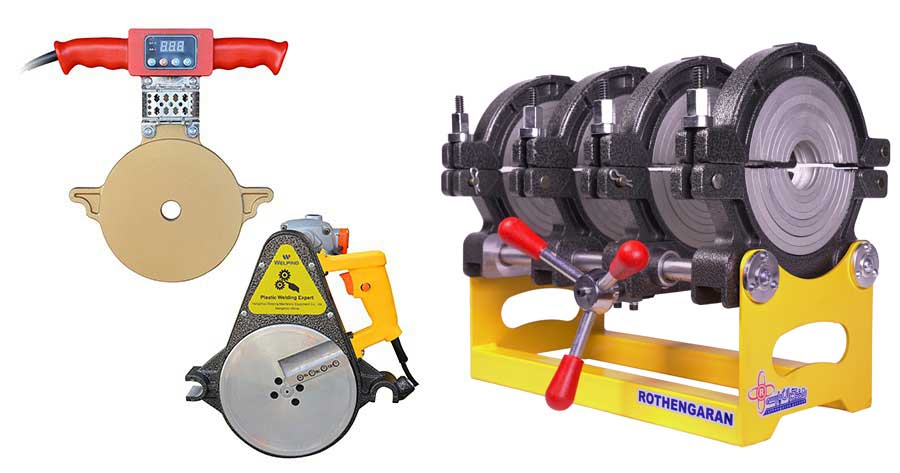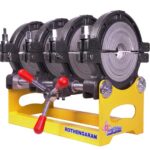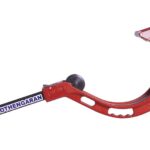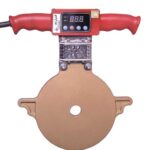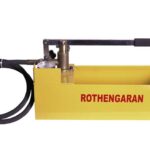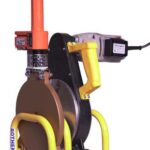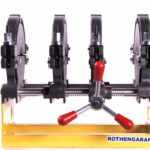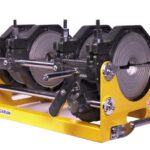Plastic Pipe Welding Machine: A Comprehensive Guide
Introduction
Plastic Pipe Welding Machine | In the world of modern infrastructure and construction, plastic pipes are an essential component used for transporting water, gas, chemicals, and other fluids. Whether it’s for residential plumbing or large industrial systems, plastic pipes offer a range of advantages including durability, cost-effectiveness, and ease of installation. However, to ensure that these pipes remain secure, leak-free, and long-lasting, proper welding techniques are necessary. This is where plastic pipe welding machines come into play.
A plastic pipe welding machine is a specialized tool designed to join two or more plastic pipes together. These machines apply heat and pressure to the pipe ends to create a strong, durable bond. Given the growing demand for plastic piping in industries like plumbing, water supply, and telecommunications, plastic pipe welding machines have become indispensable in today’s construction and maintenance processes.
In this article, we’ll take an in-depth look at plastic pipe welding machines, their types, benefits, applications, and considerations when choosing one for your project.
What is a Plastic Pipe Welding Machine?
A plastic pipe welding machine is a device used to fuse or weld two plastic pipes together using heat and pressure. The welding process involves melting the ends of the pipes and then joining them under pressure to form a strong, leak-proof bond. Plastic pipe welding is commonly used for joining pipes made of materials like PVC (Polyvinyl Chloride), HDPE (High-Density Polyethylene), PP (Polypropylene), and PE (Polyethylene).
These machines come in different designs and specifications, depending on the type of welding process they perform. Whether you’re working on a plumbing installation, a gas pipeline, or an industrial fluid system, choosing the right welding machine can significantly impact the integrity and efficiency of your project.
Types of Plastic Pipe Welding Machines
1. Butt Fusion Welding Machine
Butt fusion welding is one of the most common methods used for welding plastic pipes, particularly in HDPE pipe systems. In this method, the ends of two pipes are heated with a heated plate, then pressed together to create a strong bond.
Key Features:
- Suitable for HDPE, PP, PVDF, and other thermoplastic materials.
- Commonly used in gas and water distribution pipelines.
- Provides strong, leak-free joints with high pressure resistance.
Advantages:
- Reliable and high-quality welds.
- Used for larger diameter pipes.
- Highly durable joints, capable of withstanding harsh environmental conditions.
2. Electrofusion Welding Machine
Electrofusion welding involves the use of an electrofusion fitting, which is an electrically heated coil inside a coupling that melts the pipe ends to create a bond. This method is primarily used for connecting small to medium diameter pipes in water and gas distribution systems.
Key Features:
- Ideal for PE (Polyethylene) and PP (Polypropylene) pipes.
- Suitable for smaller diameter pipes.
- Provides precise temperature control during the welding process.
Advantages:
- Quick and easy to perform.
- Highly effective for making repairs or modifications to existing pipelines.
- Perfect for systems that require quick installation with minimal disruption.
3. Socket Fusion Welding Machine
Socket fusion welding uses a heated tool to melt the end of a pipe and a fitting, which are then pressed together to form a bond. This method is often used in smaller diameter pipes and fittings, typically in plumbing and irrigation systems.
Key Features:
- Commonly used for PVC, CPVC, PP, and PE pipes.
- Suitable for both domestic and industrial applications.
- Ideal for pipes with a diameter of up to 4 inches.
Advantages:
- Simple, fast, and reliable process.
- Requires minimal setup and equipment.
- Provides clean, precise joints with little risk of contamination.
4. Mirror Welding Machine
Mirror welding is a specialized process used for joining two plastic pipes by first heating the pipe ends and then joining them using a mirror-type heating element. This method ensures consistent heat distribution and is used in specific applications like pharmaceutical pipelines or highly sanitized systems.
Key Features:
- Ideal for small diameter pipes.
- Provides uniform heating of the pipe ends.
- Common in high-purity systems.
Advantages:
- Precise control over the welding process.
- Suitable for applications requiring high cleanliness and purity standards.
- Effective for applications involving sensitive materials like food or pharmaceutical products.
Key Benefits of Using a Plastic Pipe Welding Machine
1. Durability and Strength
Plastic pipe welding machines create joints that are often stronger than the pipes themselves. The welding process fuses the pipe ends together, ensuring a strong, leak-proof seal. This is especially important for applications in water distribution, sewage systems, and industrial fluid transport.
2. Leak-Free Joints
The primary advantage of welding over traditional methods like gluing or clamping is the ability to create completely leak-free joints. This is critical for both residential and industrial pipelines, where even small leaks can lead to significant damage, maintenance costs, and inefficiency.
3. Cost-Effective
While the initial cost of a welding machine may seem high, the long-term savings are considerable. Welding ensures that the joints are strong and long-lasting, reducing the need for future repairs and replacements. Additionally, plastic pipes themselves are generally cheaper than metal alternatives, so the overall project cost remains lower.
4. Easy and Efficient Installation
Plastic pipe welding machines simplify the installation process. They allow for fast, on-site welding without the need for special skills or extensive training. This not only reduces labor costs but also improves the speed of the project, particularly for large-scale operations.
5. Versatility
Plastic pipe welding machines are versatile and can be used with a wide range of thermoplastic materials like PVC, PE, and PP. This makes them suitable for various industries, including plumbing, water treatment, oil and gas, and telecommunications.
Applications of Plastic Pipe Welding Machines
Plastic pipe welding machines are used in a wide range of industries and applications. Some of the most common include:
- Plumbing: For joining pipes in residential and commercial water systems.
- Gas Distribution: Used to create leak-proof joints in gas pipelines, particularly in HDPE systems.
- Irrigation Systems: Ideal for joining pipes in agricultural irrigation and water distribution systems.
- Industrial Fluid Systems: Commonly used in the chemical, food, and pharmaceutical industries for safe and reliable fluid transport.
- Telecommunications: Used to create strong, durable pipe joints for fiber optic and other telecommunication networks.
How to Choose the Right Plastic Pipe Welding Machine?
When selecting a plastic pipe welding machine, several factors should be considered to ensure it suits your specific project requirements.
1. Pipe Material
Ensure the welding machine is compatible with the type of plastic material you’re working with. Different machines are designed to handle specific materials such as HDPE, PVC, or PP.
2. Pipe Diameter
The machine’s welding capacity should match the pipe diameter. Larger machines are needed for big pipes, while smaller machines are suited for smaller pipe diameters.
3. Welding Method
Choose the welding method that best fits your project—whether butt fusion, socket fusion, or electrofusion, each method has its specific applications and advantages.
4. Portability
If your project requires welding on-site or in tight spaces, consider a lightweight and portable welding machine. Some models are compact and easy to transport, making them ideal for maintenance work and field installations.
5. Power Source
Plastic pipe welding machines come with different power options, such as electric or hydraulic. Ensure that the power source matches the available infrastructure and your operational needs.
6. Quality and Brand
Investing in a machine from a reputable manufacturer ensures long-lasting durability and after-sales support. Brands with good customer reviews are typically a reliable choice.
Conclusion
Plastic pipe welding machines are vital tools in the construction and maintenance of piping systems across various industries. From plumbing to industrial applications, these machines ensure strong, durable, and leak-free joints that are crucial for the safe transport of fluids and gases. Whether you’re working on large-scale infrastructure projects or smaller plumbing systems, selecting the right welding machine can greatly impact the success of your project.
By understanding the different types of welding machines and their applications, you can make an informed decision that suits your needs. With the right equipment, you can ensure that your plastic piping systems are reliable, cost-effective, and built to last.
As a leading company in the sale and service of plastic pipe welding machines, our company is ready to serve you and your country!
Please contact us if you are interested.

